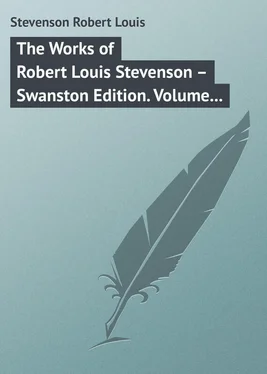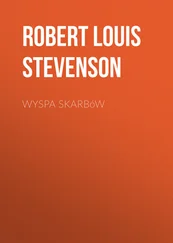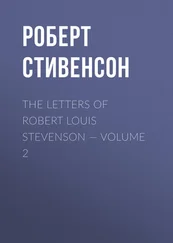Robert Stevenson - The Works of Robert Louis Stevenson – Swanston Edition. Volume 10
Здесь есть возможность читать онлайн «Robert Stevenson - The Works of Robert Louis Stevenson – Swanston Edition. Volume 10» — ознакомительный отрывок электронной книги совершенно бесплатно, а после прочтения отрывка купить полную версию. В некоторых случаях можно слушать аудио, скачать через торрент в формате fb2 и присутствует краткое содержание. Жанр: foreign_prose, на английском языке. Описание произведения, (предисловие) а так же отзывы посетителей доступны на портале библиотеки ЛибКат.
- Название:The Works of Robert Louis Stevenson – Swanston Edition. Volume 10
- Автор:
- Жанр:
- Год:неизвестен
- ISBN:нет данных
- Рейтинг книги:5 / 5. Голосов: 1
-
Избранное:Добавить в избранное
- Отзывы:
-
Ваша оценка:
- 100
- 1
- 2
- 3
- 4
- 5
The Works of Robert Louis Stevenson – Swanston Edition. Volume 10: краткое содержание, описание и аннотация
Предлагаем к чтению аннотацию, описание, краткое содержание или предисловие (зависит от того, что написал сам автор книги «The Works of Robert Louis Stevenson – Swanston Edition. Volume 10»). Если вы не нашли необходимую информацию о книге — напишите в комментариях, мы постараемся отыскать её.
The Works of Robert Louis Stevenson – Swanston Edition. Volume 10 — читать онлайн ознакомительный отрывок
Ниже представлен текст книги, разбитый по страницам. Система сохранения места последней прочитанной страницы, позволяет с удобством читать онлайн бесплатно книгу «The Works of Robert Louis Stevenson – Swanston Edition. Volume 10», без необходимости каждый раз заново искать на чём Вы остановились. Поставьте закладку, и сможете в любой момент перейти на страницу, на которой закончили чтение.
Интервал:
Закладка:
These musings occupied him while he dressed, and accompanied him into the lobby of the house. The door stood open on the garden; doubtless Alan had stepped forth; and John did as he supposed his friend had done. The ground was hard as iron, the frost still rigorous; as he brushed among the hollies, icicles jingled and glittered in their fall; and wherever he went, a volley of eager sparrows followed him. Here were Christmas weather and Christmas morning duly met, to the delight of children. This was the day of reunited families, the day to which he had so long looked forward, thinking to awake in his own bed in Randolph Crescent, reconciled with all men and repeating the footprints of his youth; and here he was alone, pacing the alleys of a wintry garden and filled with penitential thoughts.
And that reminded him: why was he alone? and where was Alan? The thought of the festal morning and the due salutations reawakened his desire for his friend, and he began to call for him by name. As the sound of his voice died away, he was aware of the greatness of the silence that environed him. But for the twittering of the sparrows and the crunching of his own feet upon the frozen snow, the whole windless world of air seemed to hang over him entranced, and the stillness weighed upon his mind with a horror of solitude.
Still calling at intervals, but now with a moderated voice, he made the hasty circuit of the garden, and finding neither man nor trace of man in all its evergreen coverts, turned at last to the house. About the house the silence seemed to deepen strangely. The door, indeed, stood open as before; but the windows were still shuttered, the chimneys breathed no stain into the bright air, there sounded abroad none of that low stir (perhaps audible rather to the ear of the spirit than to the ear of the flesh) by which a house announces and betrays its human lodgers. And yet Alan must be there – Alan locked in drunken slumbers, forgetful of the return of day, of the holy season, and of the friend whom he had so coldly received and was now so churlishly neglecting. John’s disgust redoubled at the thought; but hunger was beginning to grow stronger than repulsion, and as a step to breakfast, if to nothing else, he must find and arouse the sleeper.
He made the circuit of the bedroom quarters. All, until he came to Alan’s chamber, were locked from without, and bore the marks of a long disuse. But Alan’s was a room in commission, filled with clothes, knick-knacks, letters, books, and the conveniences of a solitary man. The fire had been lit; but it had long ago burnt out, and the ashes were stone cold. The bed had been made, but it had not been slept in.
Worse and worse, then: Alan must have fallen where he sat, and now sprawled brutishly, no doubt, upon the dining-room floor.
The dining-room was a very long apartment, and was reached through a passage; so that John, upon his entrance, brought but little light with him, and must move towards the windows with spread arms, groping and knocking on the furniture. Suddenly he tripped and fell his length over a prostrate body. It was what he had looked for, yet it shocked him; and he marvelled that so rough an impact should not have kicked a groan out of the drunkard. Men had killed themselves ere now in such excesses, a dreary and degraded end that made John shudder. What if Alan were dead? There would be a Christmas Day!
By this, John had his hand upon the shutters, and flinging them back, beheld once again the blessed face of the day. Even by that light the room had a discomfortable air. The chairs were scattered, and one had been overthrown; the table-cloth, laid as if for dinner, was twitched upon one side, and some of the dishes had fallen to the floor. Behind the table lay the drunkard, still unaroused, only one foot visible to John.
But now that light was in the room, the worst seemed over; it was a disgusting business, but not more than disgusting; and it was with no great apprehension that John proceeded to make the circuit of the table: his last comparatively tranquil moment for that day. No sooner had he turned the corner, no sooner had his eyes alighted on the body, than he gave a smothered, breathless cry, and fled out of the room and out of the house.
It was not Alan who lay there, but a man well up in years, of stern countenance and iron-grey locks; and it was no drunkard, for the body lay in a black pool of blood and the open eyes stared upon the ceiling.
To and fro walked John before the door. The extreme sharpness of the air acted on his nerves like an astringent, and braced them swiftly. Presently, he not relaxing in his disordered walk, the images began to come clearer and stay longer in his fancy; and next the power of thought came back to him, and the horror and danger of his situation rooted him to the ground.
He grasped his forehead, and staring on one spot of gravel, pieced together what he knew and what he suspected. Alan had murdered some one: possibly “that man” against whom the butler chained the door in Regent Terrace; possibly another; some one at least: a human soul, whom it was death to slay and whose blood lay spilt upon the floor. This was the reason of the whisky-drinking in the passage, of his unwillingness to welcome John, of his strange behaviour and bewildered words; this was why he had started at and harped upon the name of murder; this was why he had stood and hearkened, or sat and covered his eyes, in the black night. And now he was gone, now he had basely fled; and to all his perplexities and dangers John stood heir.
“Let me think, let me think,” he said aloud, impatiently, even pleadingly, as if to some merciless interrupter. In the turmoil of his wits, a thousand hints and hopes and threats and terrors dinning continuously in his ears, he was like one plunged in the hubbub of a crowd. How was he to remember – he, who had not a thought to spare – that he was himself the author, as well as the theatre, of so much confusion? But in hours of trial the junto of man’s nature is dissolved, and anarchy succeeds.
It was plain he must stay no longer where he was, for here was a new Judicial Error in the very making. It was not so plain where he must go, for the old Judicial Error, vague as a cloud, appeared to fill the habitable world; whatever it might be, it watched for him, full-grown, in Edinburgh; it must have had its birth in San Francisco; it stood guard, no doubt, like a dragon, at the bank where he should cash his credit; and though there were doubtless many other places, who should say in which of them it was not ambushed? No, he could not tell where he was to go; he must not lose time on these insolubilities. Let him go back to the beginning. It was plain he must stay no longer where he was. It was plain, too, that he must not flee as he was, for he could not carry his portmanteau, and to flee and leave it was to plunge deeper in the mire. He must go, leave the house unguarded, find a cab, and return – return after an absence? Had he courage for that?
And just then he spied a stain about a hand’s breadth on his trousers-leg, and reached his finger down to touch it. The finger was stained red: it was blood; he stared upon it with disgust, and awe, and terror, and in the sharpness of the new sensation fell instantly to act.
He cleansed his finger in the snow, returned into the house, drew near with hushed footsteps to the dining-room door, and shut and locked it. Then he breathed a little freer, for here at least was an oaken barrier between himself and what he feared. Next, he hastened to his room, tore off the spotted trousers, which seemed in his eyes a link to bind him to the gallows, flung them in a corner, donned another pair, breathlessly crammed his night-things into his portmanteau, locked it, swung it with an effort from the ground, and with a rush of relief came forth again under the open heavens.
Читать дальшеИнтервал:
Закладка:
Похожие книги на «The Works of Robert Louis Stevenson – Swanston Edition. Volume 10»
Представляем Вашему вниманию похожие книги на «The Works of Robert Louis Stevenson – Swanston Edition. Volume 10» списком для выбора. Мы отобрали схожую по названию и смыслу литературу в надежде предоставить читателям больше вариантов отыскать новые, интересные, ещё непрочитанные произведения.
Обсуждение, отзывы о книге «The Works of Robert Louis Stevenson – Swanston Edition. Volume 10» и просто собственные мнения читателей. Оставьте ваши комментарии, напишите, что Вы думаете о произведении, его смысле или главных героях. Укажите что конкретно понравилось, а что нет, и почему Вы так считаете.










